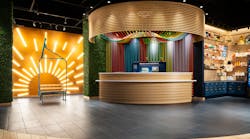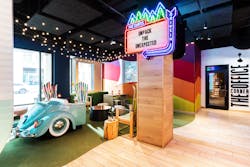For a certain class of traveler, a hotel is more than a clean bed and bathroom—it’s an escape hatch to an extraordinary experience. Hotels looking to distinguish themselves need interiors with a wow factor. The future of hotels is all about delightful design. See how hospitality is leveraging technology, experiences and sustainability to charm guests.
Technology
Automation is a powerful branding tool. Thoughtful technology elevates the guest experience, even solving some of the most common complaints. While some innovations are still down the road, like self-driving shuttles, other smart options already exist.
There are apps that combine contactless check-in and room entry. Sound masking systems provide white noise for light sleepers. TV mirrors add entertainment while preparing for the day. Even bidets are starting to make inroads.
“Our entire curtainwall system is smart glass. It automatically tints to filter UV rays and glare,” Sensenbrenner explained. “Historically, some sides of a hotel can be unbearable during certain times of the day or year because of solar heat gain. Now we have the ability to achieve climate control within the window system.”
Experiences
A portion of holidaymakers are experience junkies. These guests deliberately book an unusual or quirky amenity they can’t get at home. The sky is the limit for creativity:
- In-room gaming, musical instruments or art supplies
- Classes for fitness, cooking or mixology
- Immersive events
- Unique art collection
- E-bike and scooter rentals
- VR headsets
The Curtis (Denver, Colorado) is anything but cookie cutter. Rebranded in 2014, the hotel is an homage to pop culture. A playful lobby, whimsical elevator wraps and theme rooms are pure escapism. Every wall is the perfect selfie background.
“Our goal is to make guests stop in their tracks with how cool our property is,” said Lizzie Raudenbush, general manager and chief happiness officer. “This feeling of wonder is even more important since COVID. There’s pent-up demand for destination travel. It’s why our motto is ‘unpack the unexpected.’”
Immersive programming that builds on Denver culture is another way The Curtis intrigues guests.
“For example, the city really celebrates Pride, so we held drag queen bingo every Friday in June. It’s such an interactive event, and it was well received by guests. We also had celebrations for the opening day of the Colorado Rockies and the Stanley Cup parade,” added Megan Pierce, director of sales and marketing. “It’s the kind of experience I’m personally looking for when I travel—an adventure.”
Unique architecture is another sensory experience that guests appreciate. Misann Ellmaker, president of Imagine Consulting and Communications, is no stranger to corporate travel. Formerly with Major League Baseball for 13 years, she was constantly visiting over 150 teams. To lighten her trips, she opted for distinctive hotels. It’s a tradition that harkens back to her childhood when family gathered at the iconic pink Don CeSar (St. Pete Beach, Florida).
But her most frequented haunt is the Maritime Hotel (New York City)—she’s stayed there more than 30 times. The 1968 property was the former headquarters of the National Maritime Union, and every window is a round porthole. She’s also enjoyed a day working out of the Marine Room at the La Jolla Shores Hotel (California), which features aquarium-grade windows that are pounded by the surf.
“Business trips can be exhausting, so embedding a unique property into your stay provides a rewarding experience,” Ellmaker explained. “Even if I never have time to step out of the hotel, I can still connect with the local area and get a flavor of where I’m at.”
Sustainability
Forward-looking hotels can also adopt a strong ecological mission. Guests are looking for active environmentalism: renewable energy, native landscaping, salvaged construction materials and locally sourced food.
For example, the Inn by The Sea (Cape Elizabeth, Maine) is an oceanfront hotel. Its main draw is Crescent Beach, a state park with a one-mile stretch of sand. Maine thrives on ecotourism, so it makes sense to conserve and preserve as well. This late 1980s hotel was renovated in 2006 to LEED standards. The update included dual-flush toilets, a solar-heated pool, recycled sheetrock and EV charging stations. But the hotel’s ongoing programming is its true green heart.
“We engage our guests with whimsical events that also educate. Many travelers come here to appreciate the environment, so we have initiatives that connect them to nature,” explains Rauni Kew, the hotel’s PR and green programs manager.
One of the most popular projects is on-site dog fostering, a collaboration with a local animal shelter. Guests can walk and play with an adoptable four-legged resident, which is cared for by staff. To date, over 155 dogs have gone to forever homes, often returning with their owners for a stay.
The Inn also schedules environmental opportunities such as beach ecology walks, tours of the native landscaping and freshwater pond as well as a habitat restoration for the endangered New England cottontail rabbit. Open-air yoga and meditation classes offer further immersion.
The hotel of the future still rests on friendly staff, security and cleanliness. But creating a memorable stay is where interior design can shine. There’s an opportunity for every detail to say “Welcome, please have an incredible stay.”




